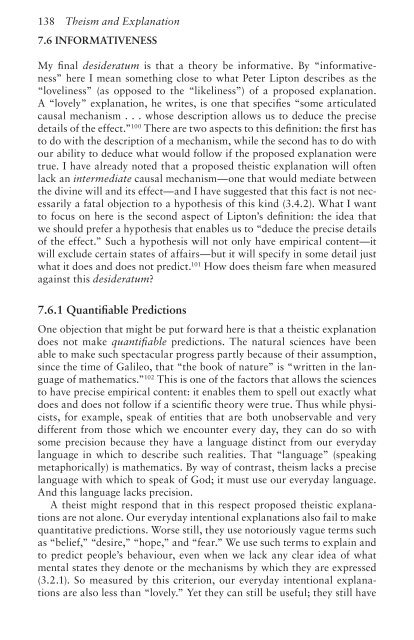Theism and Explanation - Appeared-to-Blogly
Theism and Explanation - Appeared-to-Blogly
Theism and Explanation - Appeared-to-Blogly
You also want an ePaper? Increase the reach of your titles
YUMPU automatically turns print PDFs into web optimized ePapers that Google loves.
138 <strong>Theism</strong> <strong>and</strong> <strong>Explanation</strong><br />
7.6 INFORMATIVENESS<br />
My fi nal desideratum is that a theory be informative. By “informativeness”<br />
here I mean something close <strong>to</strong> what Peter Lip<strong>to</strong>n describes as the<br />
“loveliness” (as opposed <strong>to</strong> the “likeliness”) of a proposed explanation.<br />
A “lovely” explanation, he writes, is one that specifi es “some articulated<br />
causal mechanism . . . whose description allows us <strong>to</strong> deduce the precise<br />
details of the effect.” 100 There are two aspects <strong>to</strong> this defi nition: the fi rst has<br />
<strong>to</strong> do with the description of a mechanism, while the second has <strong>to</strong> do with<br />
our ability <strong>to</strong> deduce what would follow if the proposed explanation were<br />
true. I have already noted that a proposed theistic explanation will often<br />
lack an intermediate causal mechanism—one that would mediate between<br />
the divine will <strong>and</strong> its effect—<strong>and</strong> I have suggested that this fact is not necessarily<br />
a fatal objection <strong>to</strong> a hypothesis of this kind (3.4.2). What I want<br />
<strong>to</strong> focus on here is the second aspect of Lip<strong>to</strong>n’s defi nition: the idea that<br />
we should prefer a hypothesis that enables us <strong>to</strong> “deduce the precise details<br />
of the effect.” Such a hypothesis will not only have empirical content—it<br />
will exclude certain states of affairs—but it will specify in some detail just<br />
what it does <strong>and</strong> does not predict. 101 How does theism fare when measured<br />
against this desideratum?<br />
7.6.1 Quantifi able Predictions<br />
One objection that might be put forward here is that a theistic explanation<br />
does not make quantifi able predictions. The natural sciences have been<br />
able <strong>to</strong> make such spectacular progress partly because of their assumption,<br />
since the time of Galileo, that “the book of nature” is “written in the language<br />
of mathematics.” 102 This is one of the fac<strong>to</strong>rs that allows the sciences<br />
<strong>to</strong> have precise empirical content: it enables them <strong>to</strong> spell out exactly what<br />
does <strong>and</strong> does not follow if a scientifi c theory were true. Thus while physicists,<br />
for example, speak of entities that are both unobservable <strong>and</strong> very<br />
different from those which we encounter every day, they can do so with<br />
some precision because they have a language distinct from our everyday<br />
language in which <strong>to</strong> describe such realities. That “language” (speaking<br />
metaphorically) is mathematics. By way of contrast, theism lacks a precise<br />
language with which <strong>to</strong> speak of God; it must use our everyday language.<br />
And this language lacks precision.<br />
A theist might respond that in this respect proposed theistic explanations<br />
are not alone. Our everyday intentional explanations also fail <strong>to</strong> make<br />
quantitative predictions. Worse still, they use no<strong>to</strong>riously vague terms such<br />
as “belief,” “desire,” “hope,” <strong>and</strong> “fear.” We use such terms <strong>to</strong> explain <strong>and</strong><br />
<strong>to</strong> predict people’s behaviour, even when we lack any clear idea of what<br />
mental states they denote or the mechanisms by which they are expressed<br />
(3.2.1). So measured by this criterion, our everyday intentional explanations<br />
are also less than “lovely.” Yet they can still be useful; they still have



